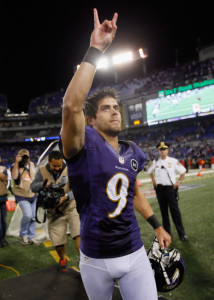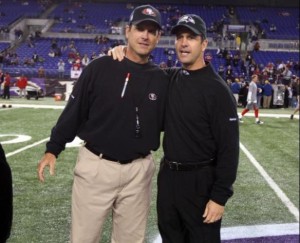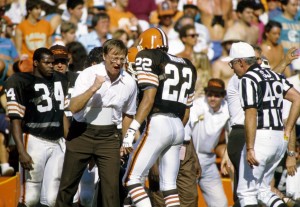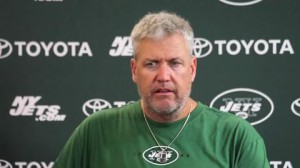It’s become trendy in this space and many others for stats folks to rail against bad 4th down decisions. It’s even trendier to do it when those conservative decisions backfire, leading to losses. But analyzing any decision — and especially decisions about whether to go for it or kick on 4th down — should not be done with the benefit of hindsight. So today, I’m going to rail against John Harbaugh, Bill Belichick, and Mike McCoy, who made some awfully timid 4th down decisions but won on Sunday. And while one could argue that they won because of those decisions, the better argument, I believe, is that they won in spite of them.
Trailing by 4 with 5:03 remaining, the Ravens kick a Field Goal on the 3-yard line
Harbaugh is no stranger to meek 4th down decision making; in fact, he’s no stranger to this particular brand of conservative coaching. Last year, he sent out the kicker when, trailing by 6 points with just over four minutes remaining in the game, the Ravens faced a 4th and 5 from the 6 yard line. Both Jason Lisk and I wrote about the silliness of this decision, which resulted in a Buffalo 23-20 victory.
Facing similar circumstances — a 4-point lead and an extra minute remaining makes it less objectionable to kick the field goal, but being on the 3-yard line makes it even worse — Harbaugh again sent out Justin Tucker to take the points. That decision cost the Ravens 0.22 expected wins; according to Advanced Football Analytics, the decision to kick a field goal instead of going for it dropped Baltimore’s win probability from 54% to 32%.
As Mike Tanier facetiously wrote, this just set up the ultimate Ravens end game: one bomb from Joe Flacco and one kick by Tucker is all the team would need to win. Sure enough, Flacco hit Steve Smith for a 32-yard catch, and Tucker kicked the chip shot for the win. The Ravens wound up having two additional possessions: after Tucker made it a 1-point game, the Browns and Ravens traded 3-and-outs, and the Browns went 3-and-out again before giving Baltimore one final possession with 1:58 remaining.
At the time of the decision to send Tucker out for a field goal, Brian Hoyer was 19 of 22 for 290 yards and a touchdown. He wound up throwing incomplete on his last three passes of the day. But if not for two Cleveland three-and-outs — the only two of the day — Harbaugh’s decision to cost his team 22 points of win probability would be generating much more backlash today. [continue reading…]





